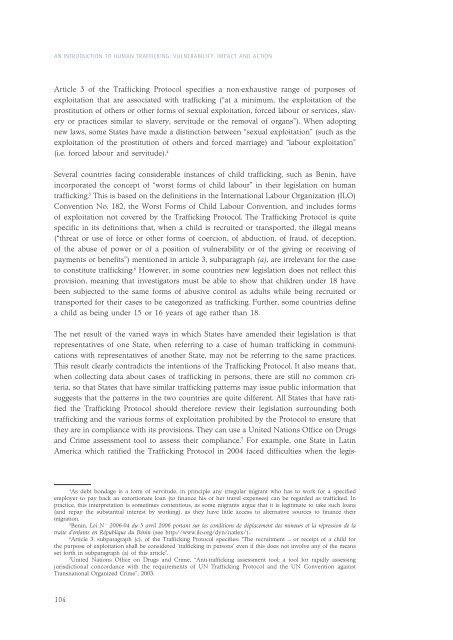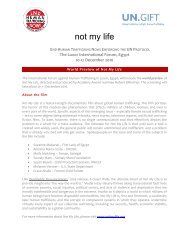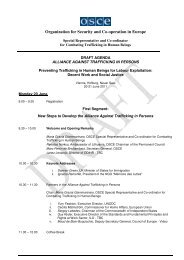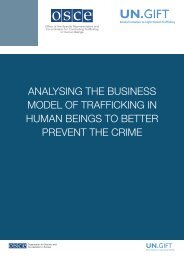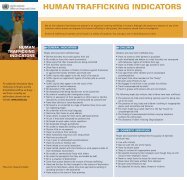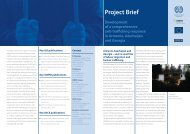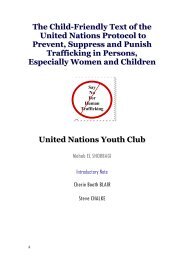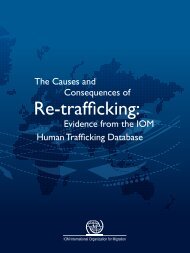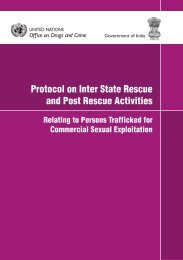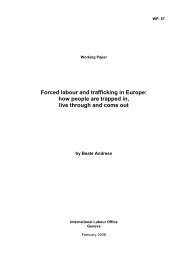An Introduction to Human Trafficking - United Nations Office on ...
An Introduction to Human Trafficking - United Nations Office on ...
An Introduction to Human Trafficking - United Nations Office on ...
Create successful ePaper yourself
Turn your PDF publications into a flip-book with our unique Google optimized e-Paper software.
AN INTRODUCTION TO HUMAN TRAFFICKING: VULNERABILITY, IMPACT AND ACTION<br />
Article 3 of the <str<strong>on</strong>g>Trafficking</str<strong>on</strong>g> Pro<str<strong>on</strong>g>to</str<strong>on</strong>g>col specifies a n<strong>on</strong>-exhaustive range of purposes of<br />
exploitati<strong>on</strong> that are associated with trafficking (“at a minimum, the exploitati<strong>on</strong> of the<br />
prostituti<strong>on</strong> of others or other forms of sexual exploitati<strong>on</strong>, forced labour or services, slavery<br />
or practices similar <str<strong>on</strong>g>to</str<strong>on</strong>g> slavery, servitude or the removal of organs”). When adopting<br />
new laws, some States have made a distincti<strong>on</strong> between “sexual exploitati<strong>on</strong>” (such as the<br />
exploitati<strong>on</strong> of the prostituti<strong>on</strong> of others and forced marriage) and “labour exploitati<strong>on</strong>”<br />
(i.e. forced labour and servitude). 4<br />
Several countries facing c<strong>on</strong>siderable instances of child trafficking, such as Benin, have<br />
incorporated the c<strong>on</strong>cept of “worst forms of child labour” in their legislati<strong>on</strong> <strong>on</strong> human<br />
trafficking. 5 This is based <strong>on</strong> the definiti<strong>on</strong>s in the Internati<strong>on</strong>al Labour Organizati<strong>on</strong> (ILO)<br />
C<strong>on</strong>venti<strong>on</strong> No. 182, the Worst Forms of Child Labour C<strong>on</strong>venti<strong>on</strong>, and includes forms<br />
of exploitati<strong>on</strong> not covered by the <str<strong>on</strong>g>Trafficking</str<strong>on</strong>g> Pro<str<strong>on</strong>g>to</str<strong>on</strong>g>col. The <str<strong>on</strong>g>Trafficking</str<strong>on</strong>g> Pro<str<strong>on</strong>g>to</str<strong>on</strong>g>col is quite<br />
specific in its definiti<strong>on</strong>s that, when a child is recruited or transported, the illegal means<br />
(“threat or use of force or other forms of coerci<strong>on</strong>, of abducti<strong>on</strong>, of fraud, of decepti<strong>on</strong>,<br />
of the abuse of power or of a positi<strong>on</strong> of vulnerability or of the giving or receiving of<br />
payments or benefits”) menti<strong>on</strong>ed in article 3, subparagraph (a), are irrelevant for the case<br />
<str<strong>on</strong>g>to</str<strong>on</strong>g> c<strong>on</strong>stitute trafficking. 6 However, in some countries new legislati<strong>on</strong> does not reflect this<br />
provisi<strong>on</strong>, meaning that investiga<str<strong>on</strong>g>to</str<strong>on</strong>g>rs must be able <str<strong>on</strong>g>to</str<strong>on</strong>g> show that children under 18 have<br />
been subjected <str<strong>on</strong>g>to</str<strong>on</strong>g> the same forms of abusive c<strong>on</strong>trol as adults while being recruited or<br />
transported for their cases <str<strong>on</strong>g>to</str<strong>on</strong>g> be categorized as trafficking. Further, some countries define<br />
a child as being under 15 or 16 years of age rather than 18.<br />
The net result of the varied ways in which States have amended their legislati<strong>on</strong> is that<br />
representatives of <strong>on</strong>e State, when referring <str<strong>on</strong>g>to</str<strong>on</strong>g> a case of human trafficking in communicati<strong>on</strong>s<br />
with representatives of another State, may not be referring <str<strong>on</strong>g>to</str<strong>on</strong>g> the same practices.<br />
This result clearly c<strong>on</strong>tradicts the intenti<strong>on</strong>s of the <str<strong>on</strong>g>Trafficking</str<strong>on</strong>g> Pro<str<strong>on</strong>g>to</str<strong>on</strong>g>col. It also means that,<br />
when collecting data about cases of trafficking in pers<strong>on</strong>s, there are still no comm<strong>on</strong> criteria,<br />
so that States that have similar trafficking patterns may issue public informati<strong>on</strong> that<br />
suggests that the patterns in the two countries are quite different. All States that have ratified<br />
the <str<strong>on</strong>g>Trafficking</str<strong>on</strong>g> Pro<str<strong>on</strong>g>to</str<strong>on</strong>g>col should therefore review their legislati<strong>on</strong> surrounding both<br />
trafficking and the various forms of exploitati<strong>on</strong> prohibited by the Pro<str<strong>on</strong>g>to</str<strong>on</strong>g>col <str<strong>on</strong>g>to</str<strong>on</strong>g> ensure that<br />
they are in compliance with its provisi<strong>on</strong>s. They can use a <str<strong>on</strong>g>United</str<strong>on</strong>g> <str<strong>on</strong>g>Nati<strong>on</strong>s</str<strong>on</strong>g> <str<strong>on</strong>g>Office</str<strong>on</strong>g> <strong>on</strong> Drugs<br />
and Crime assessment <str<strong>on</strong>g>to</str<strong>on</strong>g>ol <str<strong>on</strong>g>to</str<strong>on</strong>g> assess their compliance. 7 For example, <strong>on</strong>e State in Latin<br />
America which ratified the <str<strong>on</strong>g>Trafficking</str<strong>on</strong>g> Pro<str<strong>on</strong>g>to</str<strong>on</strong>g>col in 2004 faced difficulties when the legis-<br />
4<br />
As debt b<strong>on</strong>dage is a form of servitude, in principle any irregular migrant who has <str<strong>on</strong>g>to</str<strong>on</strong>g> work for a specified<br />
employer <str<strong>on</strong>g>to</str<strong>on</strong>g> pay back an ex<str<strong>on</strong>g>to</str<strong>on</strong>g>rti<strong>on</strong>ate loan (<str<strong>on</strong>g>to</str<strong>on</strong>g> finance his or her travel expenses) can be regarded as trafficked. In<br />
practice, this interpretati<strong>on</strong> is sometimes c<strong>on</strong>tentious, as some migrants argue that it is legitimate <str<strong>on</strong>g>to</str<strong>on</strong>g> take such loans<br />
(and repay the substantial interest by working), as they have little access <str<strong>on</strong>g>to</str<strong>on</strong>g> alternative sources <str<strong>on</strong>g>to</str<strong>on</strong>g> finance their<br />
migrati<strong>on</strong>.<br />
5<br />
Benin, Loi N° 2006-04 du 5 avril 2006 portant sur les c<strong>on</strong>diti<strong>on</strong>s de déplacement des mineurs et la répressi<strong>on</strong> de la<br />
traite d’enfants en République du Bénin (see http://www.ilo.org/dyn/natlex/)..<br />
6<br />
Article 3, subparagraph (c), of the <str<strong>on</strong>g>Trafficking</str<strong>on</strong>g> Pro<str<strong>on</strong>g>to</str<strong>on</strong>g>col specifies: “The recruitment … or receipt of a child for<br />
the purpose of exploitati<strong>on</strong> shall be c<strong>on</strong>sidered ‘trafficking in pers<strong>on</strong>s’ even if this does not involve any of the means<br />
set forth in subparagraph (a) of this article”.<br />
7<br />
<str<strong>on</strong>g>United</str<strong>on</strong>g> <str<strong>on</strong>g>Nati<strong>on</strong>s</str<strong>on</strong>g> <str<strong>on</strong>g>Office</str<strong>on</strong>g> <strong>on</strong> Drugs and Crime, “<str<strong>on</strong>g>An</str<strong>on</strong>g>ti-trafficking assessment <str<strong>on</strong>g>to</str<strong>on</strong>g>ol: a <str<strong>on</strong>g>to</str<strong>on</strong>g>ol for rapidly assessing<br />
jurisdicti<strong>on</strong>al c<strong>on</strong>cordance with the requirements of UN <str<strong>on</strong>g>Trafficking</str<strong>on</strong>g> Pro<str<strong>on</strong>g>to</str<strong>on</strong>g>col and the UN C<strong>on</strong>venti<strong>on</strong> against<br />
Transnati<strong>on</strong>al Organized Crime”, 2003.<br />
104


